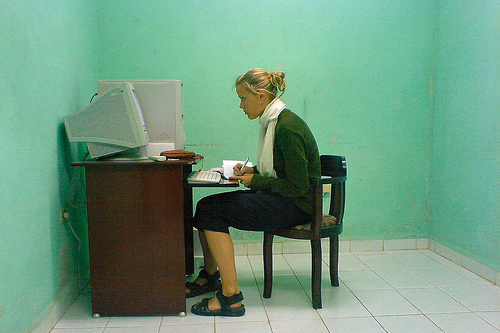Participants are not what they once were.
Back in the good old days, a training course would start with an evening of ice-breakers, group-building exercises and inspired chit-chat lasting through half the night. And it would end with a party to remember, organised by participants for participants: a night worthy of the next day’s hangover.
(Not to dream of the nights – and mornings – in between.)
Today training courses still start with an evening of ice-breakers and group-building exercises, but at the end of the official programme of that very first night people rush to the next computer, start up skype, icq and facebook and stay right there until they go to bed.
And the farewell evenings are not much different: there might be some sort of a small programme, but as soon as that is over, everyone is sprinting to their beloved computer to join those who didn’t even come.
(Not to speak of the similarly dreadful nights in between.)
Here is the irony of this situation: in a recent training course, people had created a group on facebook and become virtual friends with participants that sometimes they had, in real life, not talked to at all.

How weird is that?
I can’t put my finger on the reasons for this development. Does the current generation of young people have party angst? Are we mostly gathering nerds these days who need the keyboard under their fingers and the spike of seven simultaneous windows for pure survival? We might indeed be the first zeitzeugen to experience the ultimate wave of NADD!
Consequently, I am not sure how to respond to this phenomenon of individualism and web 2.0 addiction. Has it now become the responsibility of the team to organise evenings that are fun? Should we run our trainings through skype and facebook instead? Should we announce our courses on paper only again, to reach people who can still talk without a computer between them?
Or should we simply add a new qualification to our profile of participants:
» Applicants need the ability to socialise with real people.


Comments
5 responses to “Changing group dynamics”
This dependency on online friendships is certainly not healthy, and for the generation of young people growing up with it uncritically, even deadly, sadly.
That is why my favourite training venues don’t have internet connection (or there is one-with the cable) and almost no mobile connection ;)
Other option (often met in Germany): there is wi-fi, but it’s so expensive that people rather choose non-virtual conversations among each other.
However, “the old times” are gone and indeed the dynamics in groups after the programme are pretty different. Still some people find it interesting to chat and party with each other untill morning, while others spend all the night by computer. Whatever happens, that’s the only thing that could happen…It’s all about personal choices.
I agree it is all about choices, and we can’t make the new connectivity and online spleen of people go away… But I wonder, still: if we offered an alternative choice, an evening programme, a movie connected to the training theme, a cool evening – would people’s choices be the same?
Or should we include specific time slots for catching up with work and social networks in the programme – to make clear we have actually planned for it?
Today is the last evening of the Seminar there I was working for almost a week with people from across Europe. I decided to spent some time in my room before the party will start checking emails, skypeing and updating my blog. Guess what did happen? I missed the time when people left for a party to the local pub! The article is to the point!
Oh my, I hope you found the crowd and the pub and all!